EXCLUSIVE: Armenia vs. Azerbaijan; A 40-Year-Long Road to Peace
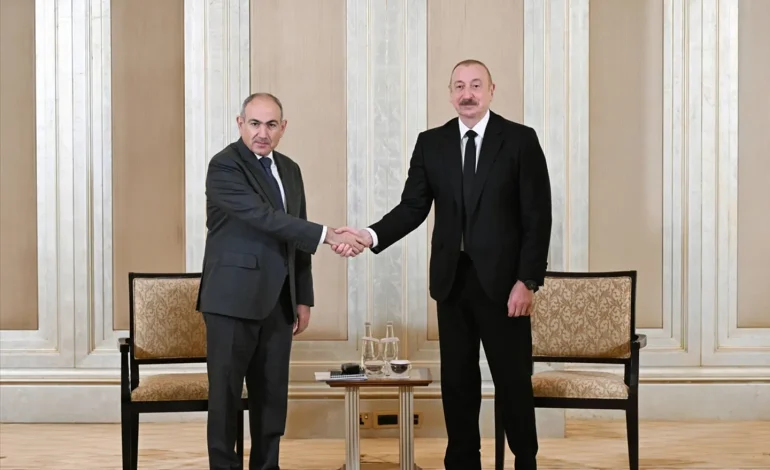
For decades, the Armenia–Azerbaijan conflict has flared, cooled, and reignited, centered around the bitter dispute over Nagorno-Karabakh. But after a whirlwind of wars, ceasefires, and shifting alliances, a rare and precarious opportunity for a final peace has emerged in the South Caucasus. To understand how we got here—and where things might go—Wyoming Star sat down with Dr. Anar Valiyev, an Associate Professor of Public Affairs at the School of Public and International Affairs, and a former Jean Monnet Chair (2020–2023).
Dr. Valiyev has long observed the geopolitical chessboard that is the Caucasus. In this exclusive interview, he walks us through the roots of the conflict, the role of external powers like Russia, Iran, Turkey, and even China, and how the Zangezur Corridor—a 40-kilometer strip of land—could become either a symbol of regional cooperation or the next geopolitical flashpoint.

Wyoming Star: I wanted to talk to you about the current state of affairs between Armenia and Azerbaijan. I also wanted to touch a little bit on the history of the Nagorno-Karabakh conflict, but more so on the way it affects modern-day relations. And I also want to discuss the way other actors in the region affect the negotiation process: Russia, obviously, Turkey, Iran, and Georgia.
Anar Valiyev: Let’s go for a little bit of history, and I’ll then explain what’s going on between Azerbaijan and Armenia. I wouldn’t go too far into the past with the history of the 1920s and 1930s. So in 1988, when the Soviet Union still existed, there were the Armenian Soviet Republic, the Azerbaijani Soviet Republic, and a territory of Karabakh that was called the Autonomous District of Karabakh. It was part of Azerbaijan, and the majority was represented by the Armenian population. So this Armenian population, starting from 1988, began to protest against the central government of Azerbaijan and write petitions to Soviet Union leadership, asking them to transfer this territory of Karabakh, this part of Azerbaijan, to Armenia. Based on the fact that a majority of the population there were Armenians, and these Armenians are oppressed, and so on. This was the main idea behind the Armenian claims towards Azerbaijan. So for the 2-3 years that the Soviet Union still existed, this region became a place of ethnic clashes between Armenians who wanted to become a part of Armenia and the central government of Azerbaijan and the central government of the Soviet Union, which sent their troops. At the end of 1991, when Azerbaijan became independent, together with Armenia, it led to the full-scale war. While Azerbaijan wanted to just stop this fighting and stop this local separatism, Armenian separatists in this territory, with the help of the Republic of Armenia, began ethnically cleansing Azerbaijani territories. Within the 2-year period from 1992 to 1994, until May 5, when a final ceasefire was signed, Armenians were able to ethnically cleanse not only Karabakh but also surrounding territory. And approximately 750,000 Azerbaijanis were cleansed from this territory, and Azerbaijan had one of the biggest shares of internally displaced people in the world. Almost 10% of the populations were internally displaced people. It was in 1994. On May 5th we signed a ceasefire, not a peace agreement, with Armenians. We were going for the peace negotiation, but this was a period when the Azerbaijani army was completely disoriented. There was a coup d’état in Azerbaijan. Russians wanted to come back. It was a really difficult period. So, starting from 1994 for 26 years, Azerbaijan was negotiating with Armenia about the possibility of returning the occupied territories and discussing the status of Karabakh.
Wyoming Star: But the clashes continued through this period.
Anar Valiyev: But it was not a full-scale war. There was occasional fighting, exchanging fire, and so on and so forth. This continued for the last 26 years, until 2020. In 2020, Azerbaijan was finally able to push forward and regain territories that were occupied by Armenians. Not only the whole of Karabakh, but also surrounding areas. The Russian government interfered and decided to put the Russian peacekeepers on the line between Armenian separatists and Azerbaijan. It was in 2020. In September 2023 Azerbaijan put forward an ultimatum to Karabakh separatists, telling them:
“Okay, this is my territory. Either you surrender, or I start a counterterrorist operation.”
They didn’t surrender. Azerbaijan started a counterterrorist operation, destroying separatist armies, that led to, in fact, the exodus of Armenians from Karabakh to Armenia. By the end of 2023, Karabakh was completely free of any kind of foreign forces. Azerbaijan was able to regain its own territory and restore territorial integrity. Within a year the Azerbaijani government asked Russian peacekeepers to leave because there was nobody to protect anymore. That’s the short history of what’s happening between Azerbaijan and Armenia related to the Karabakh conflict. Ever since, Azerbaijan and Armenia have been negotiating a final peace agreement where Armenia would recognize the territorial integrity of Azerbaijan. Because the biggest problem right now is that the Armenian constitution has a reference to the Declaration of Independence of Armenia, where it’s written that Karabakh is a part of Armenia. This is the biggest challenge for Azerbaijan, because having a constitution of a neighboring country claiming your territories is not acceptable. So Azerbaijan is negotiating with Armenia, pushing through to change this clause in the constitution. That would lead to a full-fledged peace agreement between Azerbaijan and Armenia, opening the borders, opening diplomatic relations, economic cooperation, and getting rid of enmity between the two nations. That’s the first condition. The second condition is Azerbaijan not demanding but asking for a certain type of passage from the mainland of Azerbaijan to the exclave called Nakhchivan through Armenian territory without checkpoints.
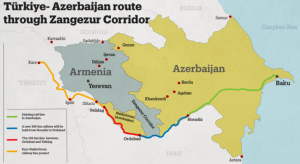
Wyoming Star: That is exactly my next question. That’s a so-called Zangezur Corridor?
Anar Valiyev: Well, Azerbaijan calls it that. It irritates Armenians because they say that there’s no such thing as a corridor. Well, Armenian concern is understandable because they’re scared that this corridor is going to have extraterritorial status that would lead to the cutting of Armenia from Iran.
Wyoming Star: So this corridor is situated on the border with Iran?
Anar Valiyev: Exactly. If you look at the border with Iran, it’s only 40 kilometers.
Wyoming Star: That explains Iranian opposition to this proposal.
Anar Valiyev: Yes, Iran is also opposing it, because it looks at it as a project of Turkey and Azerbaijan to get united with each other for political, economic, and military goals that will cut off Iran from Europe.
Wyoming Star: So it’s a way to exert economic and military pressure.
Anar Valiyev: Azerbaijan wants access to its exclave without any checkpoints through the railroad, through the road, or something like that. Iran and Armenia look at it as something that will cut off their lines. Turkey, China. Central Asia and Europe want this corridor because it will allow transportation of the goods and services from China to Europe and from Europe to China. The United States also supports it.
Wyoming Star: It will also bypass Iran.
Anar Valiyev: Exactly. It will be bypassing Iran and going through friendly states like Turkey and Azerbaijan, then Armenia, then Azerbaijan again, then the Caspian Sea, Kazakhstan, and China. So this whole corridor is going to open up this new transportation link between West and East. Iran is scared that it will get bypassed and cut off from Europe. Armenia is okay with this corridor, but it’s scared that Azerbaijan will push for extraterritoriality. Azerbaijan is saying there is no need for extraterritoriality:
“We don’t want to use territories. We just want a free passage without any checkpoints from our territory to our territory.”
Wyoming Star: Well, that’s interesting. So for Azerbaijan, it’s mainly an economic project?
Anar Valiyev: Exactly. It’s economic because we see it as a way to get access to the Turkish market and to the world ocean through Turkish ports. Because right now, despite the fact that Azerbaijan has access to the sea, the Caspian Sea is not a world ocean. It doesn’t have access to the world ocean. It has access through the Russian territories. Access through Turkey to the world ocean is much easier. It’s also much easier to go through Turkey rather than Georgia, because if you go through Georgia, you still have the Black Sea. And the Black Sea security is endangered right now because of the war between Russia and Ukraine.
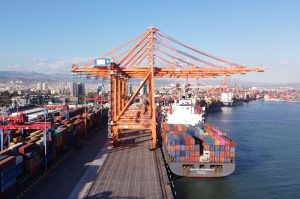
Wyoming Star: What’s the Turkish opinion on this corridor? Do they want it as well?
Anar Valiyev: Yes. They see this corridor as access to Central Asia, the Turkic-speaking nations of Central Asia. For them this is kind of vital. For Azerbaijan, it’s also vital because it gives us access to the world ocean. Both economically and politically. Turkey, as a NATO country, is also considered as one of the main allies of Azerbaijan that helps Azerbaijan to protect itself.
Wyoming Star: And from the Chinese side are there any other interests in this corridor other than the economic one?
Anar Valiyev: I don’t think the Chinese have too much military or political interest in this part of the world except purely economic. Why? Because right now, if you look at Chinese exports via sea, that’s really problematic, because there are several bottlenecks. It’s the Molucca Straits near Singapore. There’s Sri Lanka. There’s the Diego Garcia base in the Indian Ocean. And then you come to the Red Sea, where pirates and the Houthis are. Then you have a Suez Canal that can become stuck because of one big ship or something like that. And then you have an alternative that can get to Europe faster, cheaper, and less politically sensitive. There are actually just the three countries. You go from China to Kazakhstan. Through the territory of Kazakhstan to the Caspian Sea. And once you are in the territory of Azerbaijan, through Azerbaijan you go directly to Turkey. And again, there aren’t many checkpoints. There are right now checkpoints between Azerbaijan and Turkey, but in the future we envision that there will be some kind of political union between Turkey and Azerbaijan. With no border. So technically, China will need to pass its goods through only two countries. Kazakhstan and Azerbaijan, and that’s it. Then it’s a world ocean. Turkish territories.
Wyoming Star: In an exclusive comment to Wyoming Star, Mr. Tatul Hakobyan, an Armenian political reporter and analyst, author of several books, including “ARMENIANS and TURKS, KARABAKH DIARY,” and founder and expert of the ANI Armenian Research Center, wrote:
“Azerbaijan, despite its victory in the 44-day Second Karabakh War in 2020 and the ethnic cleansing of the Armenians living there in 2023, continues its zero-sum game. President Aliyev is pursuing a maximalist policy. Nothing today prevents the defeated Armenia and the victorious Azerbaijan from signing a peace treaty, but Baku demands more and presents new preconditions each time.
In this way, Azerbaijan is also holding Armenia-Turkey relations hostage. Ankara is waiting for Yerevan and Baku to sign an agreement, after which Turkey will end the blockade of Armenia that has been ongoing since 1993.”
What can you say about that?
Anar Valiyev: They talk about these unrealistic demands, but Azerbaijan has only two conditions to sign the peace agreement and to finish everything. I mean, the Karabakh conflict is over. We don’t have any problems with that. It’s over. It’s a part of Azerbaijan. There are no military forces, and there are no Russian troops. We finally were able to solve the Karabakh conflict and end separatism.
What Azerbaijan is pushing for are two kinds of clauses. The first clause. Get rid of your mentioning of Karabakh in your Constitution. To have the official paper of your neighboring country mentioning that your territory is part of their territory is a little bit not right. That makes Azerbaijanis uncomfortable. The second one is, give us access to Nakhchivan. This is our territory, our people over there.
In order to get to the mainland of Azerbaijan, they have to fly. They have to bypass Armenia through Iranian territory. They are technically in a blockade. In order to get from Nakhchivan to Azerbaijan, you have to go through Georgia or through Iran. So why don’t we just get direct access to our territory that every other country has?
Wyoming Star: And what’s, in your view, the major obstacle to the peace agreement?
Anar Valiyev: Well right now, I think, the Armenian government is working on the case of changing the Constitution. You cannot change the Declaration of Independence, but you can get rid of this clause referring to the Declaration of Independence in your constitution. Armenia is also already close to giving Azerbaijan unrestricted passage to Nakhchivan through the Zangezur Corridor.
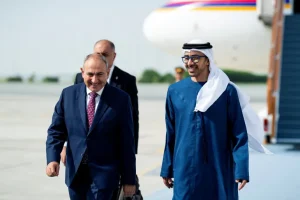
Wyoming Star: So that was exactly the point of the July 10 negotiations in the UAE.
Anar Valiyev: Exactly. That’s what they’re pushing for. And I think the Azerbaijani and Armenian governments are very close to signing a final peace deal that will include or at least state our proposal.
Wyoming Star: Do you see the issue of the revanchism in Armenia? Thoughts of returning the Karabakh region reemerging with a change of government, or any other way.
Anar Valiyev: The fear of that always exists. But there is no reason for Armenians to do it right now. If before, there were Armenians in Karabakh, Armenia could claim:
“Okay, I’m coming to save my compatriots of Armenians, who are oppressed by Azerbaijan.”
Something like that. There is no point for Armenians to intervene in Azerbaijani affairs. The only possible way is to go to a full-scale war with Azerbaijan, saying that:
“Okay, this is now my territory.”
Wyoming Star: I mean, it’s not really feasible. The Azerbaijani army is now better trained, equipped, and experienced.
Anar Valiyev: Plus, you have the cooperation between Azerbaijan and Turkey. That’s why Azerbaijan was very uncomfortable when France and India began to rearm Armenia, sending them offensive weapons. That was Azerbaijan’s main concern. Don’t rearm Armenia, because once you rearm Armenia, it would lead to another arms race, making it impossible to bring peace.
Wyoming Star: Do you attribute this change in the Armenian-Azerbaijani relations to Prime Minister Pashinyan of Armenia? Is he the one keeping the process going?
Anar Valiyev: He perfectly understands that to have a country, very small, with a 2.5-3 million population, squeezed between four countries, having no access to the world ocean. And out of the four countries you have Azerbaijan and Turkey, with whom you have bad relations, no cooperation, and no linkage. The 3rd country is Iran, which is under sanctions. Your biggest and closest ally is Russia, who is also under sanctions. So your only outside access is Georgia, which is comparatively unstable. Your only access to the sea is through the Georgian Black Sea area. That’s it. That can lead to Armenia losing its competitive advantage, losing its independence. So that’s why Armenians and Pashinyan perfectly understand that the future of Armenia is in better cooperation with Azerbaijan and Turkey.
The future of the Armenian is in the West and definitely with Azerbaijan and Turkey.
Wyoming Star: Do you see the Armenian administration as stable right now? Because there is news floating around about the conflict with the Church, the arrests of Russian-linked oligarchs, and the falling out between the younger population and the younger voters with the government. Is there a chance that after his term ends there comes another, more radical, prime minister of Armenia?
Anar Valiyev: I don’t think so. Even if this “radical” prime minister comes, I don’t think the relations will be endangered by anything. Because again, you cannot go against rational decision-making. Whatever new prime minister will come, everybody in Armenia, even pro-Russian politicians, understands. It’s impossible to strictly continue pro-Russian stance. Why? First of all, you don’t have a common border with Russia. Secondly, Russia is under sanctions. Armenia is re-exporting lots of products from Armenia and from all over the world to Russia. So it was really interesting to look at before the sanctions.
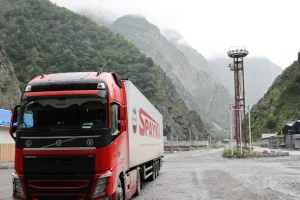
The trade turnover between Armenia and Russia was $3 billion. After sanctions, after the invasion of Ukraine, trade turnover between Armenia and Russia increased 5 times. It’s so-called “Parallel Import.” It comes to Armenia, and through Armenia, it goes to Russia.
Wyoming Star: And then it has to go through Georgia, probably?
Anar Valiyev: It doesn’t matter whether it goes through Georgia or through somewhere else. It’s made to look like an Armenian product. It’s no longer foreign. And if Russians want to sell something, they bring it to Armenia, it becomes an Armenian product, and it can be resold to the West. We talk about gold, diamonds, machinery, and technologies that come from the West to Armenia and then to Russia.
Wyoming Star: Let’s look at other actors in the region. And we’ll start with Russia. What’s the Russian position on the ongoing Armenian-Azerbaijani negotiations?
Anar Valiyev: Russia lost one of the biggest points of leverage against Azerbaijan and Armenia—the Karabakh Conflict. Both Armenia and Azerbaijan are much bolder right now and can easily push Russians to be more sensitive to Azerbaijani or Armenian needs. Russia does not have the luxury to fight or simply have bad relations with Azerbaijan or Armenia because of 2 reasons. First of all, the second conflict alongside Ukraine with some other important country like Azerbaijan is not feasible. And secondly, don’t forget that Azerbaijan has an ally that no other country has. It’s Turkey. Turkey will immediately intervene if there’s any kind of aggression toward Azerbaijan.
Wyoming Star: Turkey is also a NATO country.
Anar Valiyev: Yes, it’s a NATO country. Of course Turkey will not necessarily go directly to war, but Turkey is over there as an umbrella for Azerbaijan. During the war between Azerbaijan and Armenia in 2020, when Azerbaijan was fighting with the separatists, there was a really interesting case that Turkish F-16s were on the territory of Azerbaijan. Even before Ukraine, F-16s were in Azerbaijan protecting Azerbaijani airspace.
Wyoming Star: Turkey also has economic leverage. They can basically shut down the oil pipeline.
Anar Valiyev: It has economic leverage. Azerbaijan is important because of the transportation links between Russia and Iran and Russia and the Middle East. So Russia, right now, cannot let its territories be blockaded because of the ongoing conflict.
Wyoming Star: Let’s turn to Turkey. Basically, for Turkey, it’s mainly an economic concern. It’s a way to reach China, a way to support its long-term ally Azerbaijan, obviously.
Anar Valiyev: Also a way to get access to Central Asia.
Don’t forget about the huge market of almost 60 million people in Central Asia.
Wyoming Star: So they see the Caucasus through the economic lens and support the peace process?
Anar Valiyev: Yes.
Wyoming Star: Let’s now turn to Iran. Interestingly, in Western media Iran is now almost exclusively mentioned in the context of Israel, the Middle East, and its activities via proxies like Hezbollah, Hamas, and the Houthis of Yemen. Well, it’s debatable how dependent they are. What’s the Iranian perspective, as Azerbaijan and Armenia are both their northern neighbors?
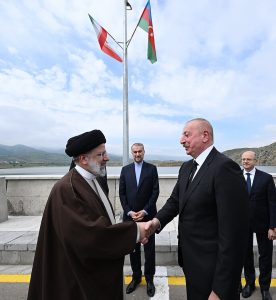
Anar Valiyev: Well, Azerbaijani relations with Iran are ups and downs. Why is that the case? Simply because Azerbaijan is much more secular. Azerbaijan is Western-oriented, which always irritates the Iranian government—“the government of the Movocrats.” The second thing is that Iran is always afraid that Azerbaijan can make alliances with Israel and the United States, and through the territory of Azerbaijan, Iran would be attacked. In the recent war, recent Israeli attacks on Iran, there were several accusations from the Iranian government against Azerbaijan that Azerbaijan provided its territory, its intelligence, and information to Israel to attack Iran.
Wyoming Star: This territorial argument seems rather strange.
Anar Valiyev: Yes, but Iran looks at it from a perspective that Azerbaijan and Israel have very close relations.
Around 60 to 70% of Israeli oil comes from Azerbaijan.
Wyoming Star: Well, that can be easily explained by the Israeli relations with the Arab States. But Turkey also has complicated relations with Israel.
Anar Valiyev: Exactly. We try to keep relations with Turkey on the brotherly level, but we perfectly understand that relations with Israel are important for Azerbaijan, firstly because of the access to new technology. Let’s put it like this. Back in the 90s–early 2000s, and even before the 2020 war in Karabakh, Azerbaijan didn’t have access to new technologies, especially military technologies, because no countries were selling to us. Neither the EU nor the US. Even Turkey was not providing us with weapons, because Turkey is part of NATO. They cannot provide weapons to Azerbaijan. So the only country that provided us with high tech was Israel.
Wyoming Star: If I remember correctly, almost 60% of the Israeli economy is high-tech.
Anar Valiyev: Exactly.
Wyoming Star: Medical technology, surveillance technology, and military technology.
Anar Valiyev: Let’s put it like this: during the war we used lots of Israeli technologies. Yes, of course, there were Turkish drones. There were also Israeli drones, Israeli technology, Israeli communication systems, Israeli rockets, and so on and so forth. We still don’t know how much information and satellite data was provided by Israel to Azerbaijan, because nobody else provided us with this data. Russians would never do it; Turkey would be bound by NATO agreements. So this was technically the case that Israel was supporting Azerbaijan in this type of war. That’s why, from that perspective, we perfectly understand it. And we keep, if not cordial, very friendly relations with Israel. I mean, business is business. So technically, when we say that we provide 60% of oil to Israel, it’s not necessarily that we directly sell oil. There’s a pipeline going from Azerbaijan to the Turkish port of Ceyhan, and Israeli tankers come and take the oil. So rather, it’s cheaper for Israel. It’s much more stable for Israel. We claim it. It’s our oil. Technically it belongs to an international consortium. But it comes from Azerbaijan.
Wyoming Star: Well, that’s also a safer route considering the Red Sea Crisis.
Anar Valiyev: Exactly. Rather than taking it from the Middle East, and you never know where you have to get it from, either from the Middle East or North Africa. It’s problematic. Azerbaijan, from that perspective, is not a life savior, but a good chance for Israel to diversify its energy. And there are recent discussions that the Azerbaijani Oil Company is entering the Israeli market to drill oil over there. The idea of a gas pipeline via Turkey to Israel that will transport Azerbaijani gas also floats around. There are a lot of discussions about this issue.
Wyoming Star: So that explains the Iranian position.
Anar Valiyev: Iran is uneasy with this. From that perspective.
Wyoming Star: But Iran does not provide any kind of help to Armenia. They do sometimes align with each other on the issue of the Corridor.
Anar Valiyev: Iran does not necessarily provide military support or too much economic support to Armenia, or something like that that we usually say. The biggest Azerbaijani grudge against Iran is that, for example, when Armenia occupied Azerbaijani territories back in 1993, the territories beyond Karabakh, Turkey immediately shut down its border. Stating that:
“Okay, unless you de-occupy Azerbaijani territories, I will not open the border.”
Wyoming Star: And isn’t it still closed?
Anar Valiyev: Yes, and that’s part of ongoing discussions. We expected the same type of attitude from Iran. It’s a Muslim country, it’s a Shia country, it’s our neighbor, it’s our brotherly nation, and so on. So we expected the same thing, but it never happened. And Iran actually said that:
“I’m not going to just shut down my border with Armenia. I will continue trading.”
They even traded with occupied territories. That made Azerbaijan really irritated.
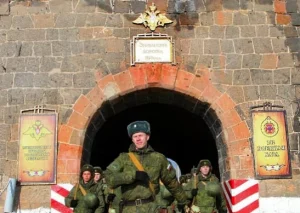
Wyoming Star: Speaking about the closed border, in Mr. Hakobyan’s analysis, he talks about the Russian troops stationed in Armenia:
“Russia is also against the opening of the Armenia-Turkey border, which has border troops on the Armenian-Turkish border and a military base in Gyumri, the second largest city in Armenia. The opening of the Armenia-Turkey border would make the Russian military presence in Armenia unnecessary.”
Anar Valiyev: I think what’s really happening over there is understandable. Armenia is scared of Azerbaijan and Turkey. That’s why the Russian troops are there. Once the border opens between Turkey and Armenia, once there’s a peace agreement between Azerbaijan and Armenia with mutual recognition of territories, there will be no more point for Russian troops to be there.
Wyoming Star: Well, that’s exactly Mr. Hakobyan’s analysis.
Anar Valiyev: Exactly so. There’s no point in Russian troops being there, and I think that everything goes in that direction. I think right now, the Turkish border is one of the points of leverage for Turkey and Azerbaijan to push Armenia towards the peace agreement. If they go for the peace agreement and accept our terms, and our terms are a constitution change and a free passage, nothing else, what they’ll get is full economic cooperation, and Turkey will open the borders. They will have full access to the world economy and get full benefits of the trade between the West and the East; they will become a part of the transportation system. They will not be isolated anymore.
Wyoming Star: So basically it all comes down to a political formality in the Constitution, some security concerns, and not much else. The revanchist ideas may still remain in the Armenian public opinion. But how popular are those ideas?
Anar Valiyev: I think Armenian society has made up its mind on that. I don’t think there’s a problem with accepting the agreement. I think they’re moving in that direction, and sooner or later it will happen.
Wyoming Star: Let’s talk about one other neighbor of both Armenia and Azerbaijan that’s sometimes being forgotten about. I’m talking about Georgia. What role does Georgia play in the Armenia-Azerbaijani relations?
Anar Valiyev: Well, Georgia for many years was one of the countries that was very friendly to Azerbaijan, and through which all Azerbaijani infrastructure projects were laid out. Gas pipeline, oil pipeline, etc.
Wyoming Star: Because it has to bypass Armenia?
Anar Valiyev: Everything was going through Georgia. Actually, in 1995 or 1996, we offered Armenia to build pipelines toward Turkey. Gas and oil pipelines.
“Let’s build through Armenian territory. It will be much cheaper. With one condition. Let’s make peace over Karabakh.”
Well, the Russian influence said, “No, we don’t want to do this,” so we built everything through Georgia.
Wyoming Star: So Georgia plays the role of a transit state?
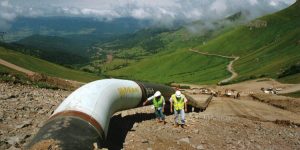
Anar Valiyev: Exactly. Having both Georgia and Armenia as transportation links is very good for Azerbaijan. Because technically, whenever goods from China come to Azerbaijan, they could go in two directions, one through the Zangezur Corridor to Turkey, the other one through Georgia to the Black Sea. Azerbaijan is becoming a hub from which it goes in every direction. There’s another route uniting Russia and Iran. Goods can flow from Azerbaijan to Russia or to Iran. So technically, you have four directions you can access through Azerbaijan. Everything comes to Azerbaijan, whether it’s from Russia, Iran, Europe, or China, and goes in any direction.
Wyoming Star: Can you speak on Georgia’s relations with Armenia?
Anar Valiyev: I think they’re not bad. They’re cooperating in certain economic areas. They are, if not cordial, friendly, because both Armenia and Georgia perfectly understand that Armenia cannot simply be hostile to Georgia. And Georgia, with two territories lost to Russia—South Ossetia and Abkhazia—and having a huge minority of Armenians in the south, does not have the luxury of having bad relations with Armenia.
Wyoming Star: And so they became somewhat of a neutral absorber to the Nagorno-Karabakh conflict. Have they played a role as a mediator in any way?
Anar Valiyev: Georgia hasn’t played too much of a role, although last year there was a discussion to maybe sign a peace agreement in Georgia as a neutral state. But we are yet to see if anything will come of that.
Wyoming Star: It looks like a political move, maybe to boost Georgian prestige. What can you say about the Western reaction to the conflict itself and the agreement? There seems to be a lack of engagement from the European and American officials. There, obviously, have been some French and US remarks encouraging the peace process and supporting the Zangezur Corridor.
Anar Valiyev: For many years Azerbaijan was pushing for this peace agreement, asking Armenia to sign it not necessarily on Azerbaijani conditions, but on conditions of recognizing the territorial integrity of Azerbaijan and taking out this part from the Constitution. Let’s open passage through Armenian territories.
But the last 5 years were lost because of the meddling of sometimes the Russians, sometimes the Iranians, and sometimes even the Americans and the French. Why? Because each side was scared that the other would monopolize this route.
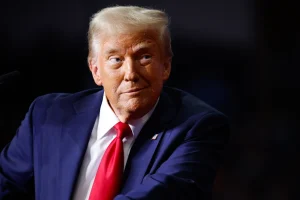
(Chip Somodevilla / Getty Images)
The Americans and the French were scared that the Zangezur corridor would be controlled by the Russians. And that was understandable. Right now the Russians are really infuriated by the recent information that this corridor will be called “Trump’s Bridge.” It will be controlled by an American company. I don’t know whether you’ve heard about this. It’s one of those—I don’t know whether it’s fake news or not, but everybody started to talk about it. And I think. It’s happened because Donald Trump twice mentioned the Azerbaijan and Armenia peace agreement as one of his successes. That led to the certain type of information being thrown. An American company offered Azerbaijan and Armenia to control this private company that will benefit both Armenia and Azerbaijan. Azerbaijan will have access to it.
Wyoming Star: The administration might be trying to stop Beijing and Tehran from taking over this route.
Anar Valiyev: This small thing, this small corridor, which is only 40 kilometers, can become really important in the future. It’s like a Panama Canal for us.
Wyoming Star: Let’s finish off with your predictions and hopes for the future. How do you see this contract ending?
Anar Valiyev: There’s no more conflict. That’s logic. We cannot expect that the next morning, once we sign a peace agreement, Azerbaijanis will go to Armenia, and Armenians will come to Azerbaijan. Because to get rid of this enmity will require a certain period of time. But it’s already happening. Right now Armenian planes go over Azerbaijani territory and Azerbaijani planes go over Armenia. That hasn’t been happening for the last 30 years. We’re already doing it. Azerbaijan does go against Armenia in international organizations. Armenia doesn’t vote against Azerbaijan. Whether it’s sporting or political events. We are both supporting each other in international events.
Slowly, step by step, we’re getting rid of the enmity.
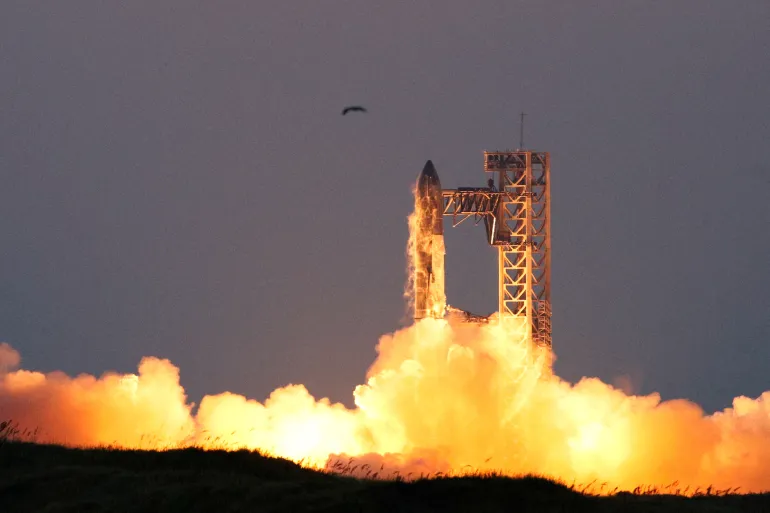

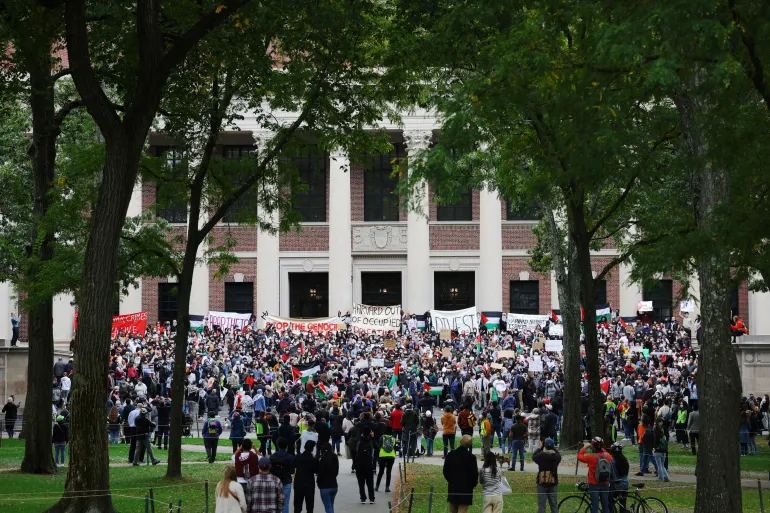
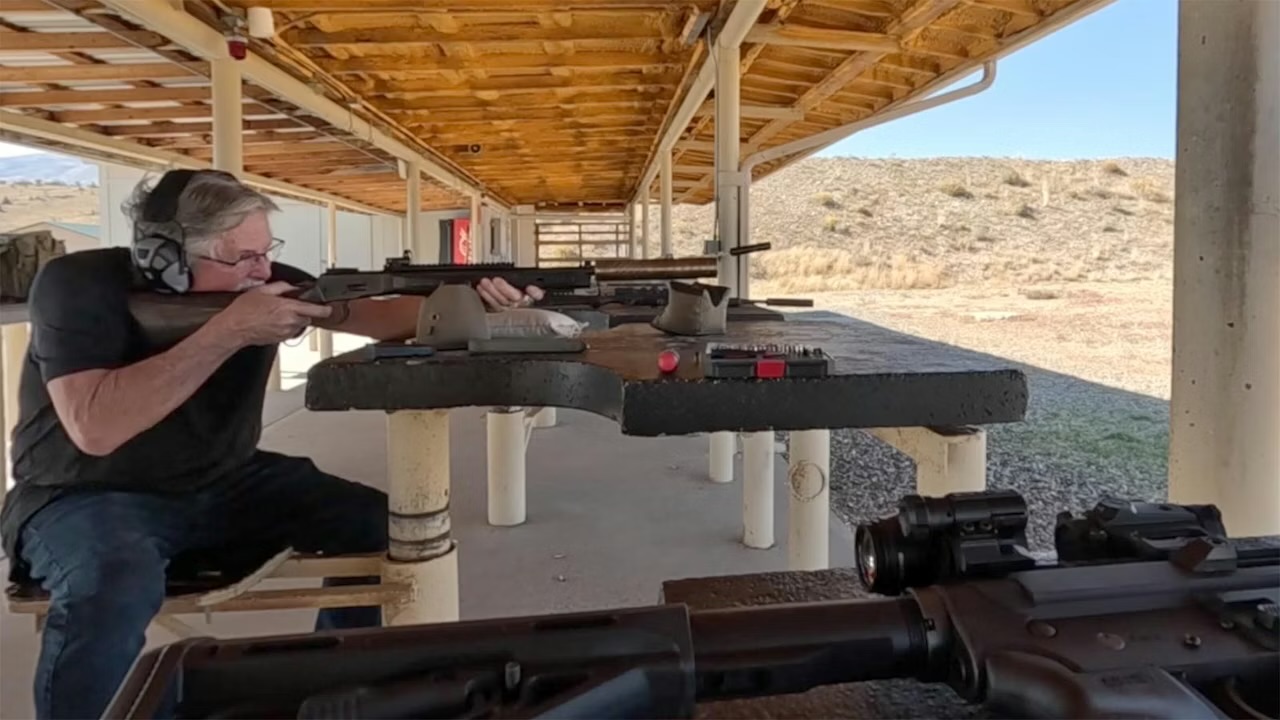





The latest news in your social feeds
Subscribe to our social media platforms to stay tuned